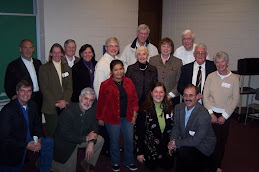Even the Vatican didn't go unscathed in the recent WikiLeak revelations. Blogger Justin Sengstock offered up some well-written and insightful reflections on the subject...
A reading from the book of WikiLeaks
Posted by Justin Sengstock on December 16, 2010
 When WikiLeaks made its great data-dump of secret diplomatic cables the other week, revealing just how raw the game of international politics can be behind its closed bathroom door, one particular sovereign state flew under the radar for a while. But the inevitable finally happened. Vatican City got WikiLeaked, too.
When WikiLeaks made its great data-dump of secret diplomatic cables the other week, revealing just how raw the game of international politics can be behind its closed bathroom door, one particular sovereign state flew under the radar for a while. But the inevitable finally happened. Vatican City got WikiLeaked, too.John L. Allen, Jr., senior correspondent for the National Catholic Reporter, wrote on December 11: “Secret diplomatic cables revealed this morning as part of the WikiLeaks releases confirm that while the Vatican was appalled by revelations of clerical sexual abuse in Ireland in 2009 and 2010, it was also offended by demands that the papal ambassador participate in a government-sponsored probe, seeing it as an insult to the Vatican’s sovereign immunity under international law.”
Therefore the Vatican ruled that the probe be unctuously deferential: “any requests for information should come through proper diplomatic channels.” And this the Irish people resented, as U.S. diplomat Julieta Valls Noyes noted: “Much of the Irish public views the Vatican protests as pettily procedural and failing to confront the real issue of horrific abuse and cover-up by Church officials.”
So it goes. The Vatican would like to be caring. But the institution has become an end goal in itself, and the aura surrounding it must remain inviolate. It is a great power among the great powers. God and the statecraft of Otto von Bismarck are one.
We often criticize institutionalism on practical grounds, for it often hardens the arteries through which noble ideas and efforts might otherwise pass. But it poses a special risk whenever God is involved, as journalist and former divinity student Chris Hedges suggests in his meditation on the Ten Commandments, Losing Moses on the Freeway.
 Hedges argues that when people or institutions “sanctify their own power,” promising us that the mystery of God “can not only be known but also manipulated,” they “lead us away from the worship of God into the corrosive idolatry of self-worship.” Our churches, although ostensibly preaching against idols, can become them. “We believe these idols will protect us, never realizing that idols are always willing to sacrifice their own, to ensure their own preservation.”
Hedges argues that when people or institutions “sanctify their own power,” promising us that the mystery of God “can not only be known but also manipulated,” they “lead us away from the worship of God into the corrosive idolatry of self-worship.” Our churches, although ostensibly preaching against idols, can become them. “We believe these idols will protect us, never realizing that idols are always willing to sacrifice their own, to ensure their own preservation.”So the Irish victims discovered when the Vatican insisted on being “pettily procedural.” So victims of abuse everywhere discovered when the successors of the apostles summoned their lawyers, shut their doors, and lowered their shades. Behind those doors and shades they determined whom to sacrifice, to ensure their own preservation—unlike Jesus, who sacrificed himself for our preservation.
I acknowledge that a total indictment of the Church simply because it is an institution would be naïve and hypocritical. I was initiated into sacramental life by a parish in the Diocese of Joliet, Illinois, and I learned my faith at a high school run by Dominican sisters and the Archdiocese of Chicago. I acquired what radicalism I have, and any theory that backs it up, at a Jesuit university. When I speak as I do about the Church as institution, I inevitably draw on resources that the Church as institution has given me.
Yet, as a believer in synchronicity, I must read John Allen’s December 11 reportage alongside Matthew 21:23-27, the Gospel for the Monday of the Third Week of Advent (December 13 this year). Jesus is teaching the crowd when the chief priests and elders approach him, demanding to know by what authority he works. Jesus insists they answer him first: was John the Baptist’s ministry of divine or human origin?
So the officials begin to debate not the answer, but how whatever answer they give will affect them. If they admit John was sent by God, they will look faithless, but if they say John was not, there might be a riot. Thus the priests and elders say they just don’t know, and Jesus refuses to cite any authority.
Worried about their power and standing within institutional Judaism, the priests and elders were on a different planet from Jesus. He simply had to leave them there and move on, because the Gospel is unintelligible to those who cover their behinds.
I do not advocate throwing away Church structures, but I do advocate poking and pushing those who run them, making them constantly attentive to the possibility that Jesus will leave them there and move on. If WikiLeaks happens to help us poke and push this time, so be it.

"Power tends to corrupt, and absolute power corrupts absolutely." Baron Acton
ReplyDelete